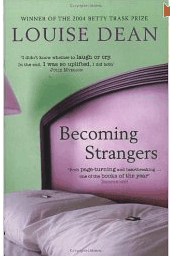"forgiving" one's past is one thing, recognizing and acknowledging its significance is another
I make it a habit to read a good novel once a year on my holiday. This year, I read Louise Dean's "Becoming Strangers" while holidaying in Singapore. This novel is so depressive that it is inspiring. The first sentence of the novel read, "Before he 'd had cancer, he'd been bored with life.." You can imagine as this gets one, how depressive it gets. The novel is about two couples meeting on a holidays in the Caribbean island. Jan (the one with the cancer) and his wife met George and his wife. The latter is the older couple. Alongside, they met other visitors on the holidays and through their interactions, having meals, drinking in the bars, going on sea cruising and BBQ, all the background and pasts of the various characters slowly uncovered and following the end of their holidays, most of them seemed to have found lights towards the other end of the tunnel as they left their holidays and got on with their lives.
The main plots of the story central on Jan and George and issues facing their lives. I found a common theme floating between Jan and George's lives. It's about one's past and whether you want to forget or not. There is a saying, "forgive but not forget". It means thinking of the past that haunt us, we can face it and not affected by it, so we "forgive" it, though we cannot forget it. In this novel, it re-addresses this issue. Jan has a problem in his marriage, he increasingly felt indifferent and even more so after he had cancer. His wife didn't feel love in the marriage and allegedly having affairs and it appears Jan knew of this, but just "keep one eye closes". His past increasingly has no meaning, with regards to his marriage, but he just want to "forget" and "get on with life". George, on the other hand, has a wife suffered from Alzheimer. She involuntarily "forget" things. George faced his wife rather helplessly. However, the past to George, is a meaningful one, unlike Jan. At the end of it, George decided that he want to jot down his past in writing, while he can still remembers. Some memories are worth recording down before one forgets.
The novel inspired me because it prompt me to re-think about the way I dealt with my past. There were some that I want to voluntarily forget, the bad one, for instance. There were also good ones, those worth recording down like George did. All in all, "forgiving" one's past is one thing, recognizing and acknowledging its significance is another. This is the key that bring meaning to our lives, in which we will always have a choice to choose to how to live.
Subscribe to:
Post Comments (Atom)


0 comments:
Post a Comment